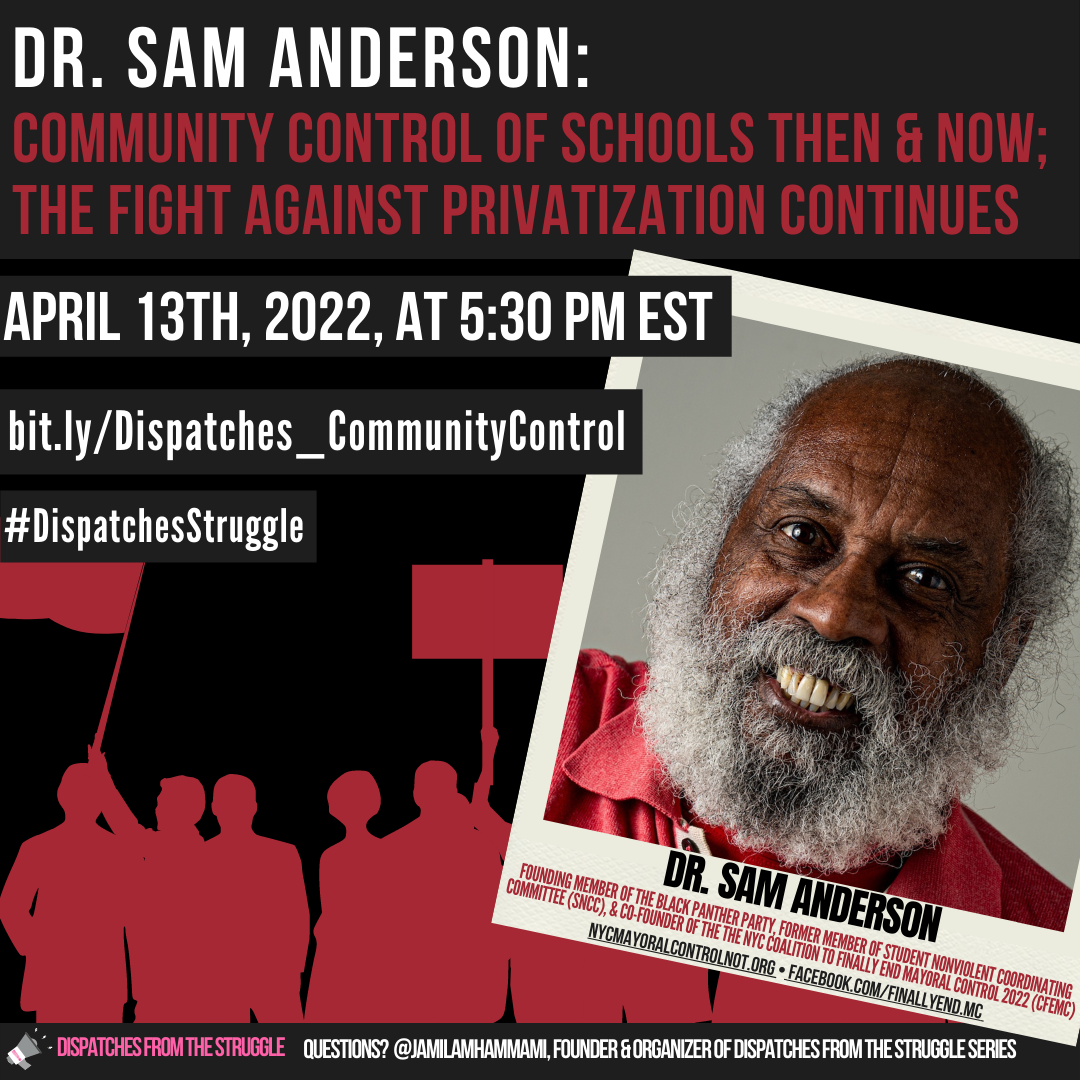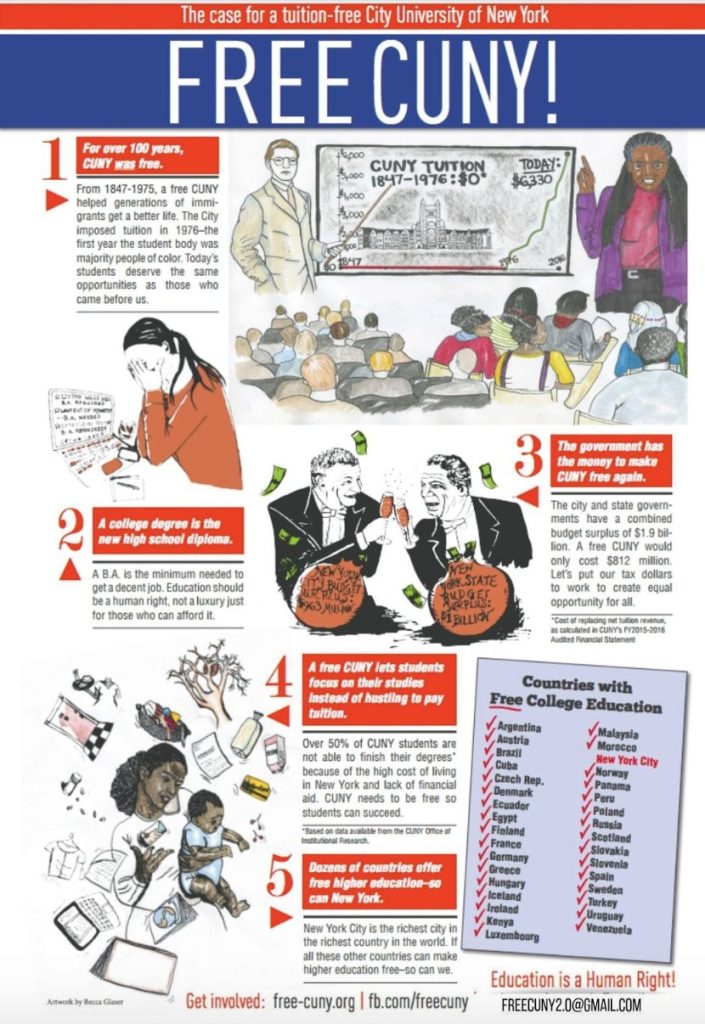
- This event has passed.
Dispatches from the Struggle with Dr. Sam Anderson: Community Control of Schools Then & Now; The Fight Against Privatization Continues
April 13, 2022 @ 5:30 pm - 7:00 pm
Free
Register via Zoom here
Community Control of Schools Then & Now: The Fight Against Privatization Continues
Date & Time: April 13th, 2022, at 5:30 p.m. EST
In this final Dispatches from the Struggle, Dr. Sam Anderson, co-founder of the The NYC Coalition to Finally End Mayoral Control 2022 (CFEMC), founding member of the Black Panther Party, and former member of Student Nonviolent Coordinating Committee (SNCC), will join us to discuss the historical and current conditions of community control of schools and the fight against privatization of education in New York City.
Dr. Sam Anderson is a retired mathematics and Black history professor who has been active in the Civil Rights and Black Liberation movements since 1964. Being a member of Student Nonviolent Coordinating Committee (SNCC) and a founding member of the Black Panther Party has allowed him to combine his decades-long activism with his scholastic work. Dr. Anderson is a co-founder of The NYC Coalition to Finally End Mayoral Control 2022 (CFEMC).
Dr. Anderson will discuss a historical overview of the privatization of New York City public schools. The 1969 New York Education Act grew out of a movement to demand decentralization and community control of the New York City school system. The Act removed the City Board of Education from mayoral control and restructured the New York City public education system. In a compromise, governance policies were transferred to the Senate and the Assembly in Albany, New York. The educational governance of predominantly Black and Puerto Rican Communities in New York City was controlled by white dominance.
Over 50 years later, Black and brown communities still feel the wake of the white dominance of the late 1960s in our public school governance policies. Dr. Anderson will discuss the contemporary era and the struggle for community control in opposition to mayoral control. Additionally, he will discuss the fight from students, educators, and community members for full community control as envisioned by the Peoples’ Board of Education.
Check out this amazing 2020 Free CUNY Infographic on the CUNY Digital History Archive (CDHA) website explaining when CUNY was free until 1976: https://bit.ly/FreeCUNY_Infographic1976
This tweet from May 2020 is an infographic, created by the CUNY activist group FreeCUNY, and tweeted out by a CUNY faculty member, depicted the history of CUNY’s costs to students until the mid-1970s and the social and economic benefits New York City reaped from its free tuition policy.
This item is part of the City University of New York (CUNY) Distance Learning Archive, a group project developed as part of Prof. Matthew K. Gold’s Spring 2020 Knowledge Infrastructures seminar in the Ph.D. Program in English at The Graduate Center, CUNY, in partnership with the Interactive Technology and Pedagogy Certificate Program. The project’s goal was to resist or trouble the discourse of catastrophe around the shift to online learning caused by the COVID-19 pandemic by documenting the lived experiences of students, faculty, and staff across CUNY’s 25 campuses. Further, the project wanted to document the moment of crisis response by taking a critical approach to educational technology.
Also, check out this critical piece from by Sean Molloy:
SEEK’s Fight for Racial and Social Justice at CUNY (1965-1969)
By Sean Molloy (23 June 2017)
Racial Exclusion Within American Colleges and the City University of New York (1960-64)
We now designate some United States colleges and universities as “historically black” and Alexandria Lockett has argued we should designate all others as “historically white.” But in the early 1960s, racial exclusion within American higher education was not yet historical. Southern white college systems fought to preserve their legally enforced de jure racial exclusion systems. Almost all northern white college systems practiced more subtle forms of de facto racial exclusion.
For example, in 1960 there were only 70,000 black students at all white US colleges, comprising only 2.4% of their total enrollment of 2.8 million students. But African-Americans constituted close to 13% of the total college age population, such that their equal proportional representation in white colleges would have been 364,000 (Molloy, 2016, pp. 40-41; Crossland, 1971).
This racial exclusion was especially glaring within the new City University of New York system (CUNY) which had consolidated New York City’s then seven municipal colleges in 1961 after the 1960 New York State Heald Commission had recommended increasing annual State funding for higher education from $300 million to as much as $1.2 billion by 1975 and doubling New York’s total college students from 401,000 to 804,000 by 1970 (Hechinger, 1960, November 16, pp. 1, 57; Gordon, 1975, pp. 82-83).
In the 1950s and 1960s, New York City was changing rapidly as “great migrations” of black and brown residents moved into the City from the American South and from Puerto Rico as throngs of white, middle-class families moved to nearby suburbs. From 1954 to 1964, black and Puerto Rican children increased from 29% to over 50% of all New York City public school students (Gordon, 1975, p. 35). By 1960, black and Puerto Rican students made up 75% of Manhattan elementary school enrollment (Ravitch, 1974, p. 261).
In theory, these black and brown New York City public school students had equal access to CUNY’s tuition-free colleges. But in practice, only a token few were admitted. In the mid-1960s, CUNY’s student body remained “by all accounts” 94 to 97% white (Warren, 1984, pp. 2, 35).
In 1963, Republican Assembly Speaker Joseph Carlino directly charged CUNY with unfair racial exclusion. According to Carlino, “only 1.9 per cent of the [CUNY] student body was Negro.” As such, CUNY “had become a haven for the elite,” with high GPA requirements that forced black and Puerto Rican students “to forgo college” (Currivan, 1963, November 27).
The NYC Coalition to Finally End Mayoral Control 2022 (CFEMC) is a newly formed, Black-led Coalition of grassroots, NYC activists who have been engaged in the struggle for education excellence and equity for a long time.
Our efforts are built on a foundation of human rights and our aim is to create a unity movement across the 5 boroughs with an understanding of the dire need to completely change the governance structure of our schools.
NYC students can no longer afford the toll on their futures from legislators who want to “keep-but-tweek” mayoral control again. No measure of reform will ever make this terrible system work for a million+ diverse students.
The Adjunct Project is working in solidarity with CFEMC’s to demand an end to NYC Mayoral Control of privatization of education and for human rights across New York City schools.
Learn more: The NYC Coalition to Finally End Mayoral Control 2022 (CFEMC) Website & Facebook
Dispatches from the Struggle is a series that focuses on intersectional community organizing and social movement struggles outside of CUNY that intersect with CUNY struggles. The Dispatches from the Struggle series was created to benefit CUNY adjuncts, graduate workers, and students through political education on critical issues that impact the CUNY community. Dispatches from the Struggle seeks to connect struggles and build solidarity and power across movements and is free and open to CUNY and the global community.
Questions? Contact the Co-Organizer of External & Labor Relations at the Adjunct Project and Founder & Organizer of Dispatches from the Struggle, Jamila Hammami, jamila.hammami[@]pm.me or on social media @JamilaMHammami
Theme by Anders Noren — Up ↑
